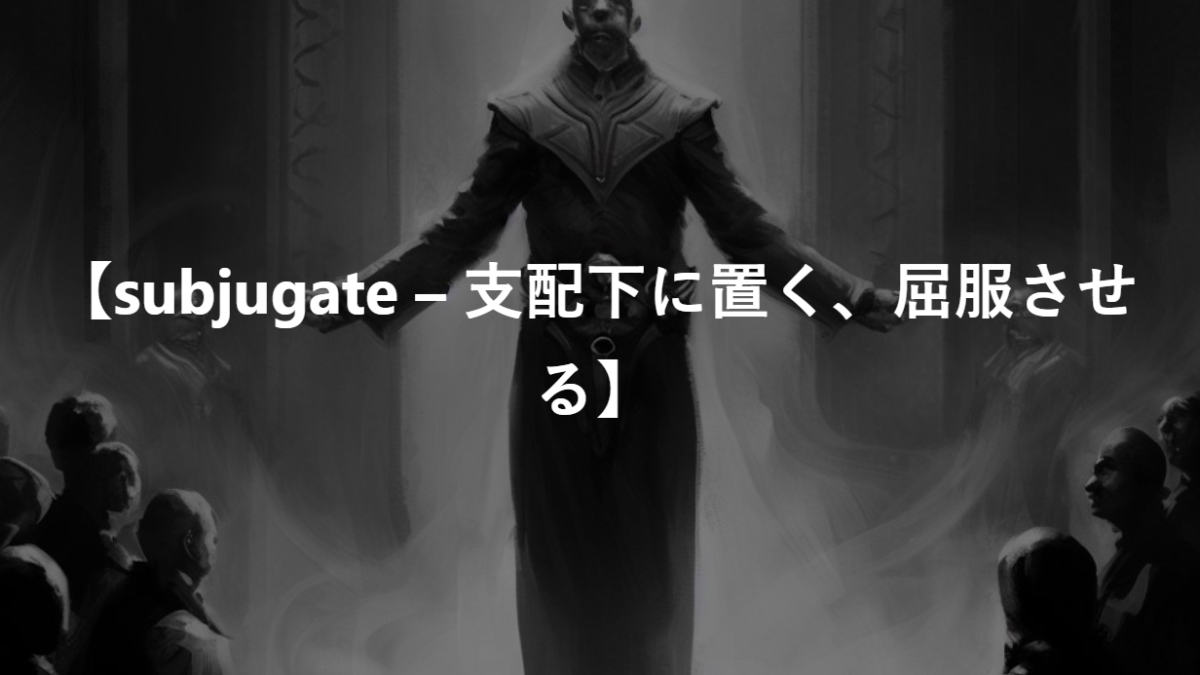派生語・語源・類義語・反対語・例文
派生語や動詞の活用
派生語や関連語
- Subjugation – 「征服」や「服従」を意味する名詞。例: “The subjugation of the native people was a dark chapter in the country’s history.”
- Subjugator – 征服者、支配者を意味する名詞。例: “He was a cruel subjugator, ruling with fear and oppression.”
- Subjugated – 「征服された」や「服従させられた」を意味する過去分詞・形容詞。例: “The subjugated population rose in rebellion.”
- Subjugal – これは非常にまれで、”subjugate” に直接関連する形容詞ですが、一般的にはほとんど使われません。
動詞の活用
- Base Form (基本形): subjugate
- Past Simple (単純過去形): subjugated
- Past Participle (過去分詞): subjugated
- Present Participle / Gerund (現在分詞): subjugating
- Third Person Singular (三人称単数現在形): subjugates
【subjugate – 支配下に置く、屈服させる】という単語の語源とか由来を知っていますか?
“subjugate”は、ラテン語の「subjugare」から派生した言葉です。この動詞は「下に置く」や「服従させる」という意味を持ちます。言葉の由来からも分かるように、他者を支配下に置いたり、抵抗を受けつつも屈服させたりする行為を表す言葉として使用されます。
この単語の類義語・反対語を教えてください。
類義語:
- Conquer(征服する)
- Dominate(支配する)
- Subdue(抑制する)
反対語:
- Liberate(解放する)
- Empower(権限を与える)
この単語に似た単語で間違いやすい単語はありますか?
「subjugate」は、他者を支配下におく行為を指す言葉であり、特に間違いやすい単語ではありませんが、「substitute」(代用する)や「submarine」(潜水艦)など、似たような”sub-“で始まる単語に注意が必要です。
この単語にまつわるエピソードなどはありますか?
歴史的には、国々や支配体制が他国や民族を支配下におくために様々な方法を用いた事例があります。古代ローマ帝国の征服、植民地時代の植民地支配、または現代の政治的な権力闘争においても「subjugate」の概念は顕著です。これらの出来事はしばしば異なる文化や意識の対立を反映しています。
この単語を使った例文を5つほど教えてください。
- The ruthless dictator sought to subjugate neighboring countries through military force. (無慈悲な独裁者は、軍事力を使って隣国を支配下におこうとしました。)
- The invaders aimed to subjugate the indigenous population and impose their rule. (侵略者たちは、先住民を支配下におき、自らの支配を押し付けることを目指しました。)
- The rebellion was crushed, and the rebels were subjugated by the ruling regime. (反乱は鎮圧され、反乱者たちは支配する政権に服従させられました。)
- Economic sanctions were imposed to subjugate the aggressive nation and force it to comply with international norms. (経済制裁が課され、攻撃的な国を屈服させ、国際的な規範に従わせるために行われました。)
- Through diplomacy and negotiation, the nations aimed to avoid subjugating one another and instead promote cooperation. (外交と交渉を通じて、国々は互いを支配するのではなく、協力を促進しようとしました。)
コロケーション
- Subjugate a people
意味: 民族を支配下に置く - Subjugate a nation
意味: 国家を征服し、支配下に置く - Subjugate an enemy
意味: 敵を屈服させる - Subjugate through force
意味: 力を使って支配する - Subjugate opposition
意味: 反対勢力を制圧する - Subjugate a territory
意味: 領土を征服し支配する - Subjugate the will
意味: 意志を屈服させる
まず、「Subjugate a people」は、ある民族を他の勢力によって支配下に置くことを意味します。次に、「Subjugate a nation」は、国家全体を征服し、支配することを指します。
「Subjugate an enemy」は、戦争や争いの結果として敵を屈服させることを意味します。また、「Subjugate through force」は、力を使って何かや誰かを支配することを指します。
さらに、「Subjugate opposition」というコロケーションは、反対勢力を制圧し、意志を抑え込むことを意味します。また、「Subjugate a territory」は、領土を征服し、その地域を支配することを表します。
最後に、「Subjugate the will」は、個人や集団の意志を抑えつけて支配することを指します。
First, “Subjugate a people” means to bring a group of people under control by another force. Next, “Subjugate a nation” refers to conquering and ruling an entire country.
“Subjugate an enemy” means to defeat and subdue an enemy as a result of war or conflict. Additionally, “Subjugate through force” refers to controlling something or someone using power or coercion.
Furthermore, the collocation “Subjugate opposition” means to suppress opposing forces and quell their will. Additionally, “Subjugate a territory” signifies conquering and ruling a specific region or area.
Finally, “Subjugate the will” refers to suppressing and controlling the will of individuals or groups.
Subjugate を使った英文法問題5問
- The invading army sought to _____ the local population and exploit their resources.
- (A) subjugate
- (B) subjugates
- (C) subjugated
- (D) subjugating
- Throughout history, many empires have risen and fallen, each attempting to _____ neighboring territories and expand their power.
- (A) subjugate
- (B) subjugates
- (C) subjugated
- (D) subjugating
- 解説: to不定詞(to + 動詞の原形)を目的語にとる動詞(attempting)の後に続くので、動詞の原形(subjugate)が適切です。
- The dictator’s regime _____ the people through fear and intimidation, suppressing dissent and limiting freedom of speech.
- (A) subjugate
- (B) subjugates
- (C) subjugated
- (D) subjugating
- 解説: 文脈から過去時制が適切であり、主語が単数なので、動詞に”-d”を付けて過去形にします。
- The colonial powers _____ the indigenous populations, exploiting their labor and resources for their own gain.
- (A) subjugate
- (B) subjugates
- (C) subjugated
- (D) subjugating
- 解説: 文脈から過去時制が適切であり、主語が複数なので動詞に”-d”を付けて過去形にします。
- The oppressive laws and policies _____ the citizens, denying them basic rights and freedoms.
- (A) subjugate
- (B) subjugates
- (C) subjugated
- (D) subjugating
- 解説: 文脈から過去時制が適切であり、主語が複数なので動詞に”-d”を付けて過去形にします。

